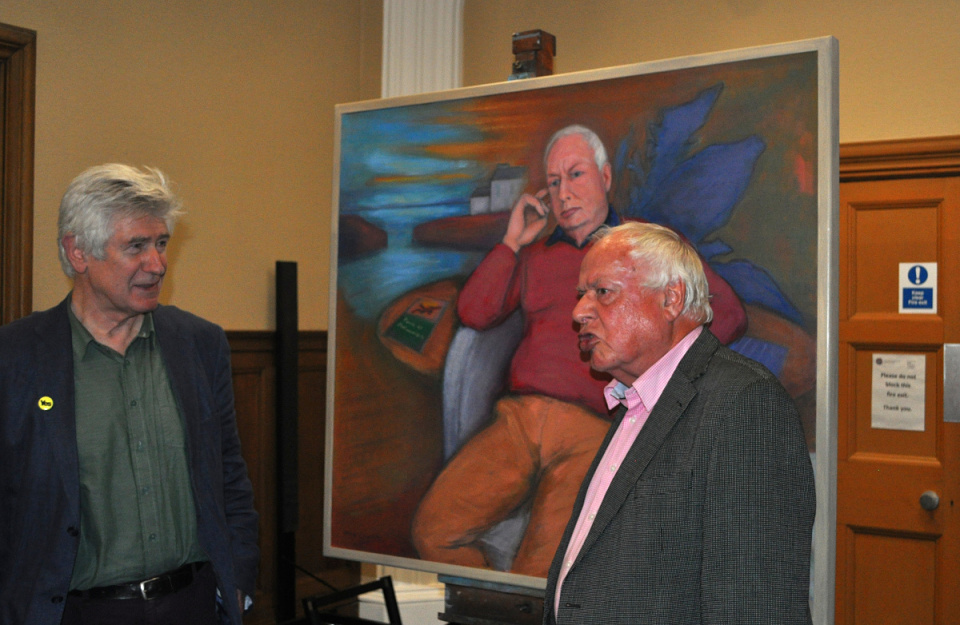Tom Nairn – A Resource
The 2 previous posts on Tom Nairn were https://nomadron.blogspot.com/2023/01/anthony-barnett-and-tom-nairn.html and https://nomadron.blogspot.com/2023/01/tom-nairn-curmudgeon-extraordinaire.html
This last post will simply try to summarise his significance and reference his key articles
Tom was involved in the discussions in the late 1950s which led to the establishment of the New Left Review and a prolific author for them (see list of pieces below)
He was of of one of the Hornsey Art School staff who sided with the students in 1968. He was fired and blacklisted and only got a tenured academic job when he was 70 – in Australia. He celebrated with Global Matrix – nationalism, globalism and state terrorism published with Paul James in 2005
Apart from his discovery of Gramsci in Italy, another seminal period was his time in the early 1970s as a Fellow of the Transnational Institute in Amsterdam which is well captured here -
The TNI, founded by the American radical Sam Reuben, was a left-wing think-tank which became a refuge and agora for a multitude of socialist intellectuals from all over Europe, including the so-called socialist countries in the Soviet bloc, and from the developing world. Most were independent Marxists of one shade or another. Nairn was a Fellow of the TNI between 1972 and 1976. He has said that
“once I was there, a lot of things changed completely as a result, including my relationship with home, and earlier versions of ideology and so on. I learned about different styles of Marxism, from a variety of points of view that the TNI made possible.”
At the Transnational Institute, he was encountering dissident Marxists from eastern Europe, who were finding their way to the TNI in Amsterdam by many routes. Nairn recalls those meetings as “a process of Europeanisation”, confirming another of his own original lines of reflection.
It’s only in the last few years that attempts have been made to summarise his work for a larger public - with Neil Davidson, Neal Ascherson, Gerry Hassan, Ben Jackson, Scott Hames and Rory Scothorne all publishing overviews in the past decade or so.
In Perspective, Tom Nairn; Neil Davidson (1998) a detailed dissection of Nairn’s writings
The Breakup of Tom Nairn? (2002) one of the few sustained critiques of his writings
Gordon Brown – Bard of Britishness (2006) – a rather sarcastic essay of his with critical commentary from a range of opinions.
Globalisation and Nationalism – the new Deal Tom Nairn (Open Democracy 2008)
The Enchanted Nat; (2010) s critical piece which tries too hard to be clever
A Global Scot of Ideas; Gerry Hassan (Scotsman 2012) Positive if not hagiography
A Scottish Watershed? Neil Davidson (NLR 2014) more an analysis of the Scottish referendum
Lucky Thinker – an interview with Tom Nairn by Scott Hames (Scottish Affairs 2016)
Painting Nationalism Red? Neal Ascherson (2018) a quite excellent and sympathetic overview of of Nairn’s opus
“From the Outer Edge” - Review of Asherson’s book; Rory Scothorne (LRB 2018)
"The Case for Scottish Independence – a history of nationalist political thought in modern Scotland” Ben Jackson (2019) the most thorough exploration of this strand of thinking with detailed consideration of Tom Nairn’s contribution
Tom Nairn – the prophet of post-Britain; Rory Scothorne (New Statesman article 2021) a sympathetic and overdue profile from the leftist London journal
Tom Nairn – a guide through the ruins of Britain; Gerry Hassan (Scottish Review Jan 2023) A suitable tribute
The New Statesman tribute is here
Neal Asherson’s final tribute https://www.lrb.co.uk/the-paper/v45/n04/neal-ascherson/on-tom-nairn is behind an LRB paywall
Tom Nairn – globalisation and the new middle class - George Kerevan’s Farewell (Conter Jan 2023) a fascinating piece from someone who followed him down the nationalist route. And a Conter podcast had this discussion with Kerevan
His “New Left Review” articles (as a subscriber, I’m able to view them in full but some of them will be behind a paywall)
https://newleftreview.org/issues/i17/articles/tom-nairn-crowds-and-critics 1962
https://newleftreview.org/issues/i27/articles/tom-nairn-the-nature-of-the-labour-party-part-i 1964
https://newleftreview.org/issues/i28/articles/tom-nairn-the-nature-of-the-labour-party-part-ii.pdf 1964
https://newleftreview.org/issues/i49/articles/tom-nairn-the-three-dreams-of-scottish-nationalism.pdf 1968
https://newleftreview.org/issues/i75/articles/tom-nairn-the-left-against-europe-special-issue.pdf 1972
https://newleftreview.org/issues/i83/articles/tom-nairn-scotland-and-europe.pdf 1974
https://newleftreview.org/issues/i94/articles/tom-nairn-the-modern-janus.pdf 1975
https://newleftreview.org/issues/i130/articles/tom-nairn-the-crisis-of-the-british-state 1981
https://newleftreview.org/issues/i200/articles/tom-nairn-the-sole-survivor 1993
https://newleftreview.org/issues/i230/articles/tom-nairn-reflections-on-nationalist-disasters 1998
https://newleftreview.org/issues/ii1/articles/tom-nairn-ukania-under-blair 2000
https://newleftreview.org/issues/ii9/articles/tom-nairn-mario-and-the-magician 2001
https://newleftreview.org/issues/ii7/articles/tom-nairn-farewell-britannia-break-up-or-new-union
https://newleftreview.org/issues/ii23/articles/tom-nairn-a-myriad-byzantiums 2003
https://newleftreview.org/issues/ii37/articles/tom-nairn-the-new-furies 2006 on Tariq Ali
https://newleftreview.org/issues/ii43/articles/tom-nairn-union-on-the-rocks 2007
